Curriculum
The Liberal Arts and Sciences BA/BSc Program is a 4 year, 240 ECTS credit study program with a progressive storyline, covering academic skills, specialization, and room for exploration.
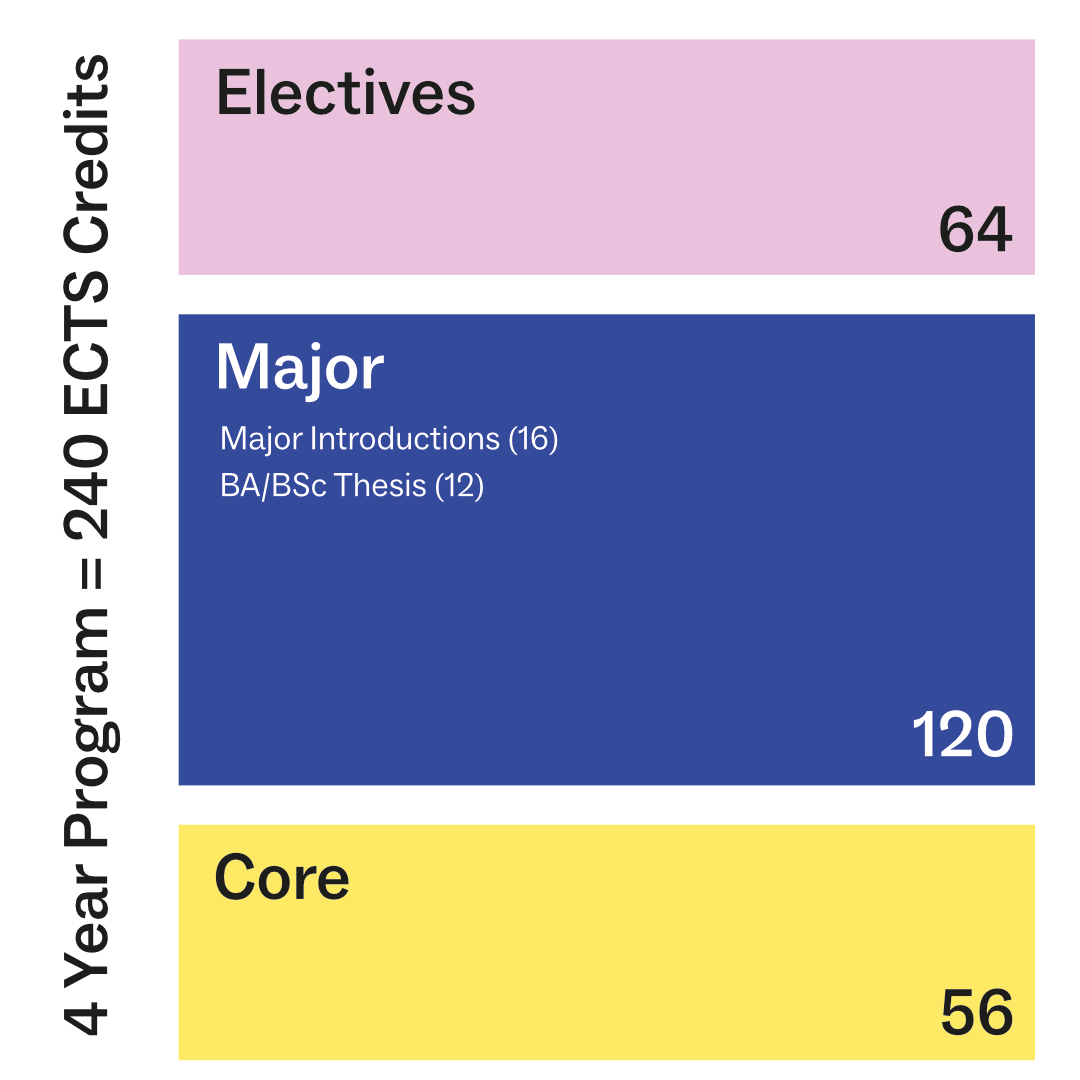
In the Electives, students undertake courses, including studies abroad, and projects to deepen and/or broaden their studies and to enhance their profile.
The Majors provide an in-depth education in an interdisciplinary academic field. At the end of the Foundational Year and after having taken three Introductions, students choose one of the following:
- Culture and History
- Governance
- Life Sciences
- Environmental and Sustainability Sciences
The Core includes basic and advanced academic skills, reflections on knowledge and science, and a curriculum on responsibility and leadership. Core courses are taken by all LAS students.
The LAS Curriculum in Detail
The Core provides a shared foundation for knowledge and reflection in academic and non-academic contexts. It combines skills, research methods, and general epistemology, includes philosophical and practical elements, and consists of the following modules:
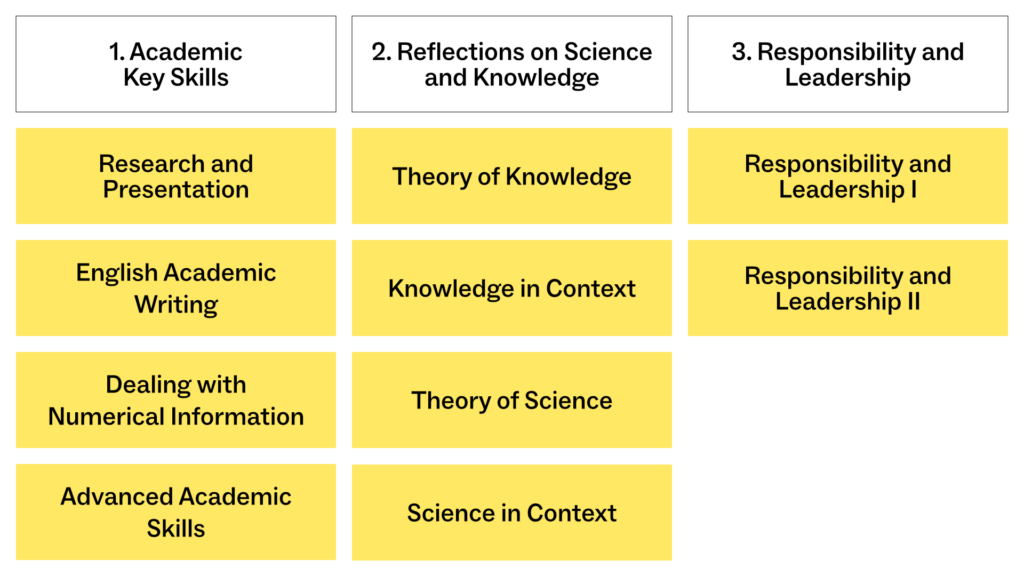
The Module Handbook has a full description of each module. The Course Catalog lists the courses on offer per module.
1. Academic Key Skills
Especially in the Foundational Year, students develop and sharpen their academic key skills: research and analytical methods, researching and working with academic literature and sources, and academic presentation.
2. Reflections on Science and Knowledge
The Program’s emphasis on reflections on scientific knowledge and methods is mirrored in the two UCF professorships: Epistemology and Theory of Science (ETS) and Science and Technology Studies (STS).
These four Core modules form the LAS inter- and meta-disciplinary backbone and provide a coherent framework for the Majors. Key ETS topics include logic, the human epistemic condition, epistemic and social status of scientific theories, the progress of science, and the reality of scientific objects. STS courses focus on science, technology, and academia from a historical and a modern perspective and explore their interdependence on society, as well as on everyday knowledge practices.
3. Responsibility and Leadership
These courses inspire and equip students to engage with future challenges and goals. They prompt students to think about their roles and responsibilities in the world, as well as their personal vision in life. The two sequential modules focus on four themes: social (in)equality, personalities and group processes, applied ethics, and leadership. Courses combine academic work with personal reflection and training in more experiential formats.
For more information about the LAS Core, please contact Thorsten Leiendecker.
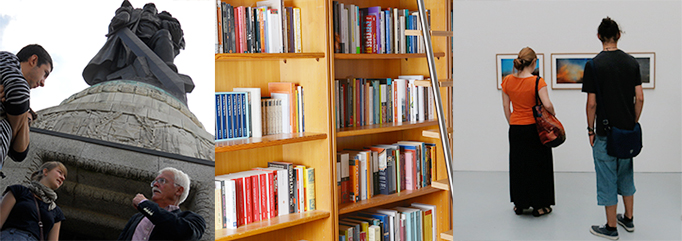
The Major Culture and History is the humanities concentration in LAS. It focuses on the academic study of the cultures and histories of people from around the world and across time. Students sample an exciting range of topics while developing their ability to analyze all kinds of cultural objects, frame strong questions about cultural-historical problems, and produce coherent interpretive arguments – classic humanistic skills that are relevant to individual reflection, academic research, and global public life. Culture and History’s interdisciplinary approach to the humanities combines history, philosophy, anthropology, and the study of art, music, and literature.
The following chart gives you an overview of the modules in the Culture and History Major:
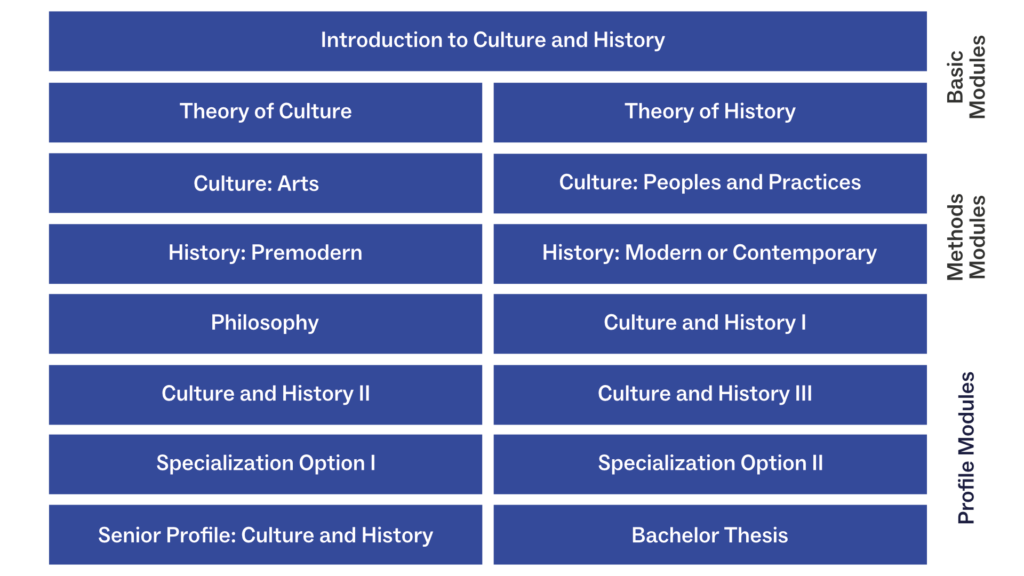
The Module Handbook has a full description of each module. The Course Catalog lists the courses on offer per module. And for an overview of what Culture and History graduates do after graduation from UCF, please see our After LAS page.
For more information about the Culture and History Major, please contact Dr. Ryan Plumley.
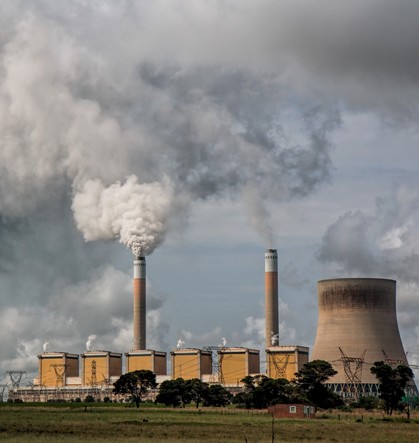

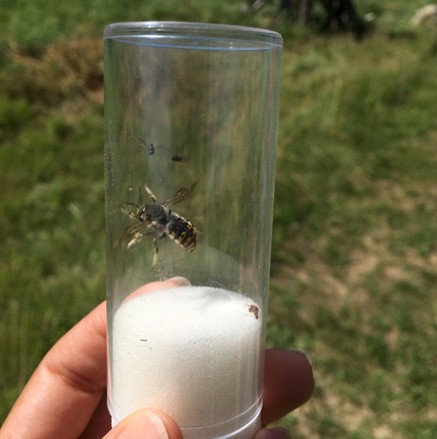
The Major Environmental and Sustainability Sciences (ESS) concentrates on the interactions and interdependencies between human activities and the environment. It has a strong focus on sustainability, understood as a question of balancing environmental, social, and economic objectives. ESS students engage in scientific work related to contemporary environmental issues (e.g., climate change, biodiversity loss, food production, energy supply), while being introduced to ESS research methods. After completing the ESS basic modules, students expand and apply their foundational knowledge in ESS profiling modules that provide students with specialization opportunities, e.g., in questions of sustainable resources use, energy supply, and/or environmental governance.
The following chart gives you an overview of the modules in the ESS Major:
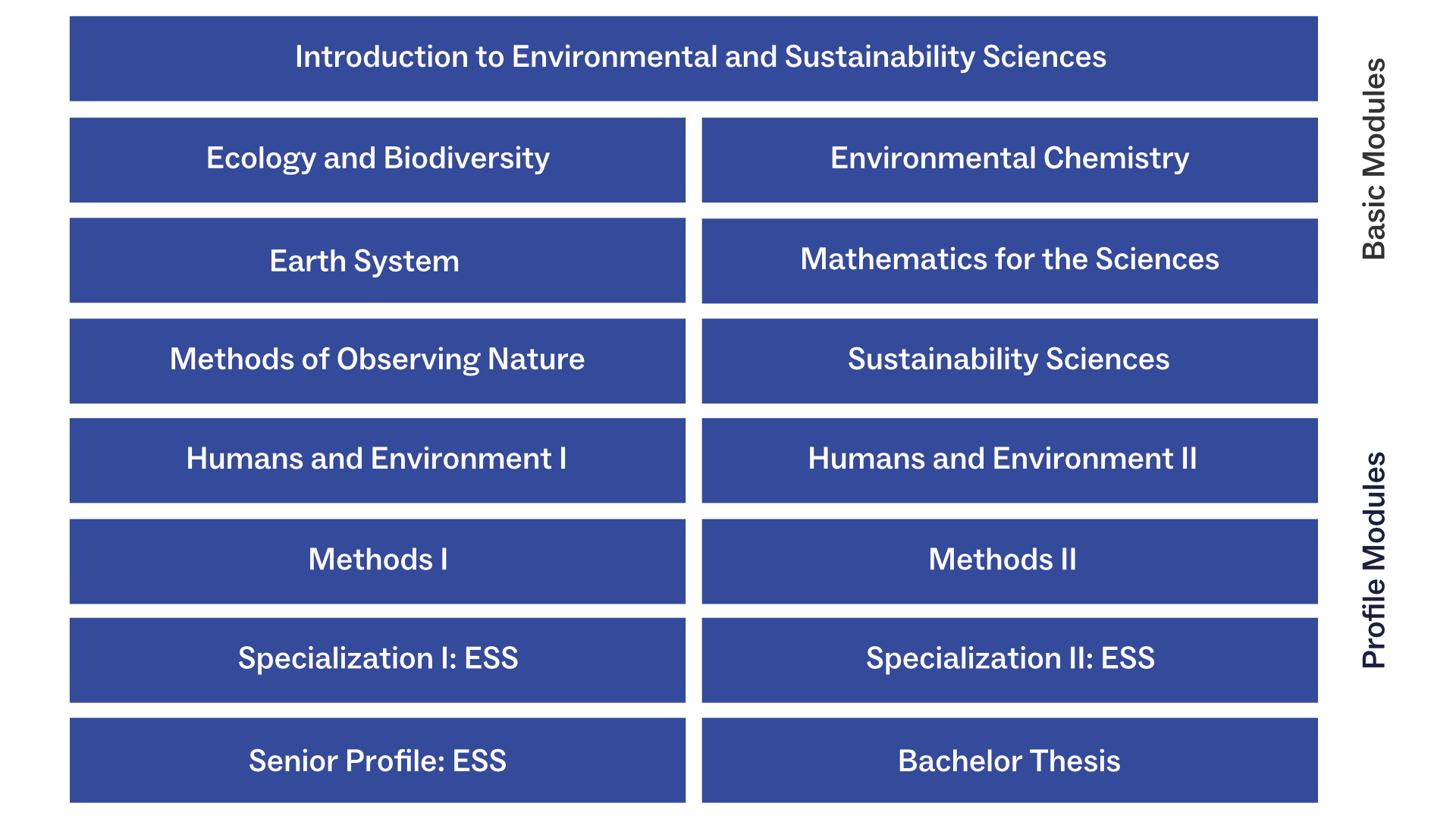
The Module Handbook has a full description of each module. The Course Catalog lists the courses on offer per module. And for an overview of what ESS graduates do after graduation from UCF, please see our After LAS page.
For more information about the ESS Major, please contact Maiara Gonçalves-Wintermantel or Dr. Hanna Helander.
For a student perspective, check out the student-run ESS website that covers experiences, courses and lecturers as well as internship and graduate programs.
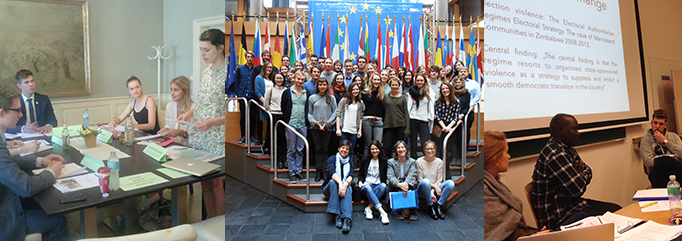
Governance studies what happens when many people live together and depend on each other. It is about the negotiation and achievement of common goals, such as peace, prosperity, and happiness. The Major Governance is different from a program in political science or in law because it covers a broader range of social science disciplines. It is oriented around three central areas of inquiry: communities, states, and markets. In answering questions about communities, states, and markets, the Major draws on social sciences and legal studies: political science (political theory, comparative politics, and international relations), classical and behavioral economics, political sociology and public administration, and legal studies, especially human rights and international law.
The following chart is an overview of the modules in the Governance Major:

The Module Handbook has a full description of each module. The Course Catalog lists the courses on offer per module. And for an overview of what Governance graduates do after graduation from UCF, please see our After LAS page.
For more information about Governance Major, please contact Dr. Mila Mikalay.

The Major Life Sciences is organized around human beings and their interaction with other humans and the environment. Specifically, in the Life Sciences Major students explore biological questions about the body and the embodied mind and how they relate to the natural and constructed environment. In this regard, the human being is considered to be both a researching subject and a subject of research. The Major Life Sciences gives students a strong research-oriented foundation in the natural sciences and enables them relate scientific questions to social, cultural, and environmental contexts. After fundamental courses in chemistry, cell biology, and physiology, students start developing an individual study profile by choosing classes from biomedicine, neurosciences, behavioral and cognitive sciences, public health, medical biotechnology, and related fields. Two methodological classes and a laboratory internship complement the content-related advanced classes and provide the scaffolding for more research-oriented and specialized classes.
The following chart gives you an overview of the modules in the Life Sciences Major:
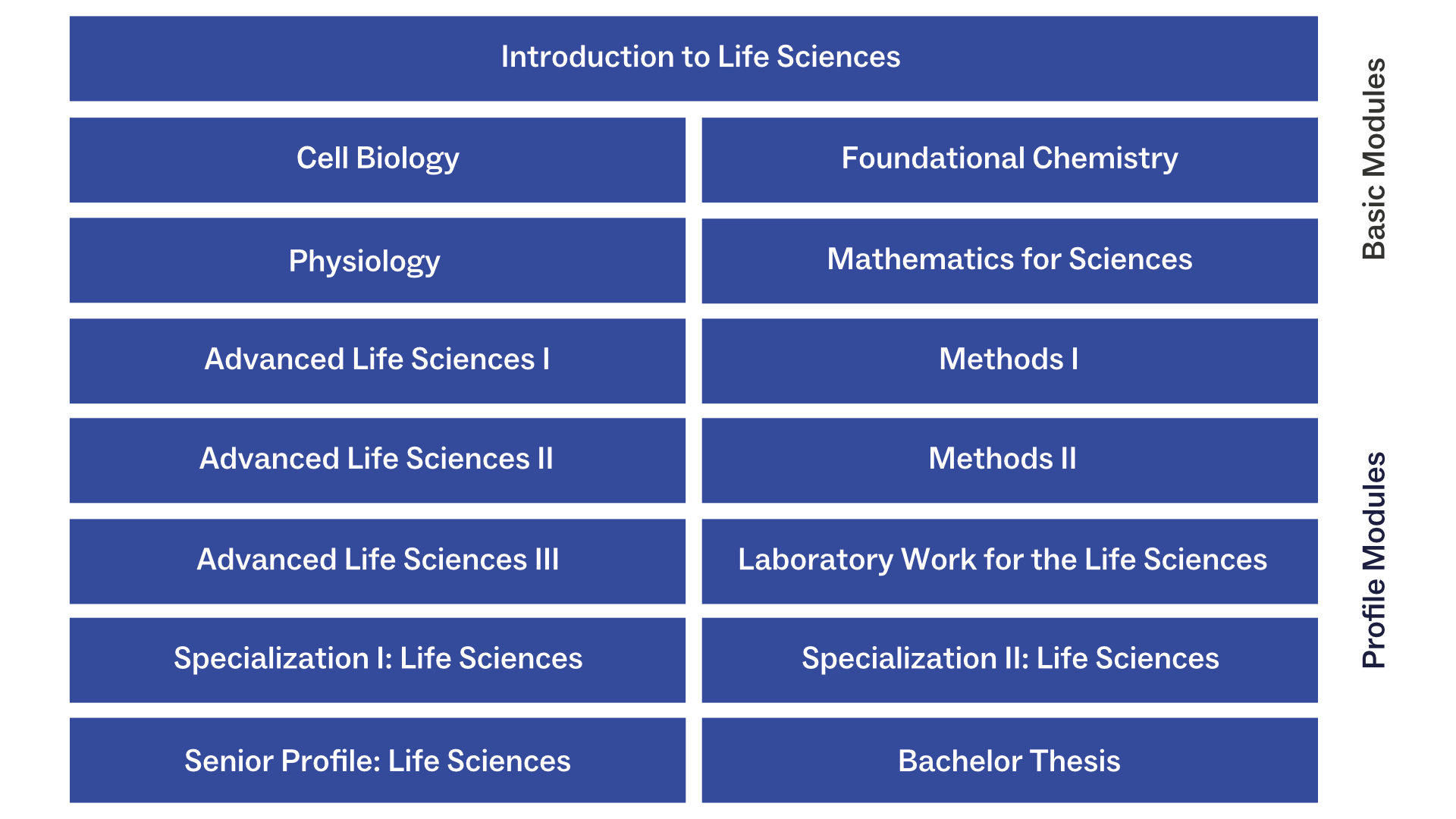
The Module Handbook has a full description of each module. The Course Catalog lists the courses on offer per module. And for an overview of what Life Sciences graduates do after graduation from UCF, please see our After LAS page.
For more information about the Life Sciences Major, please contact Dr. Simon Büchner.

With their Electives, students can supplement their Major, shape their academic profile, and deepen and/or broaden their studies in many different ways:
- courses from other LAS Majors
- non-LAS University courses
- study abroad
- language-learning courses
- internships and practical projects
Academic advisors support students in making well-informed choices. Please also see the Study and Exam Regulations and the credit recognition information on ILIAS.